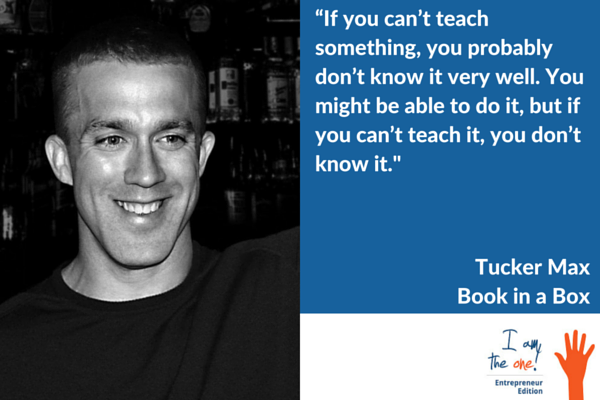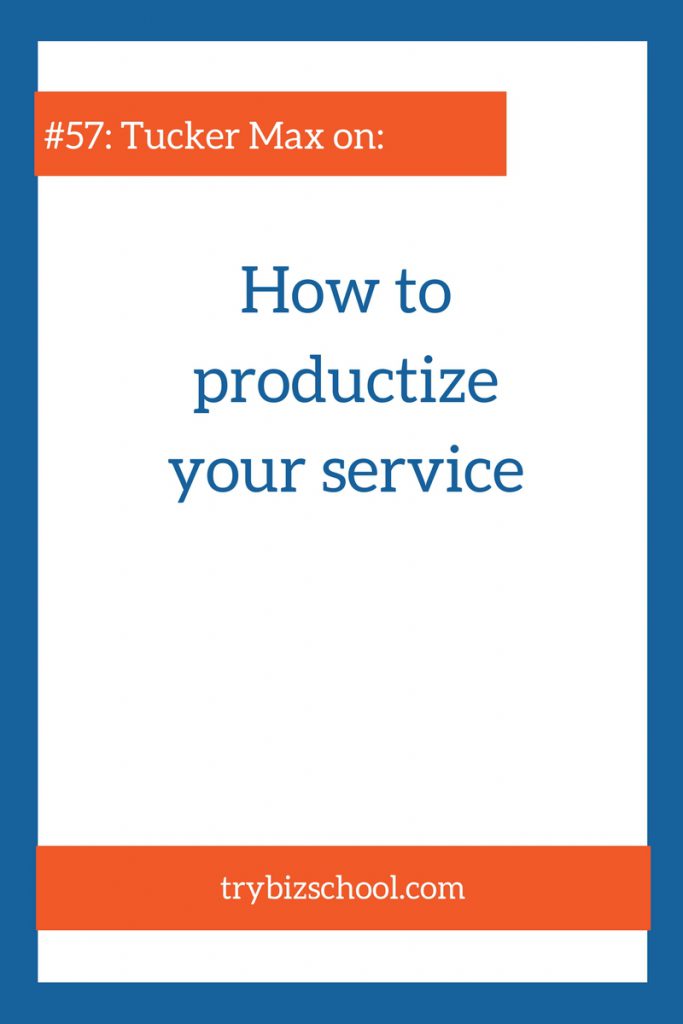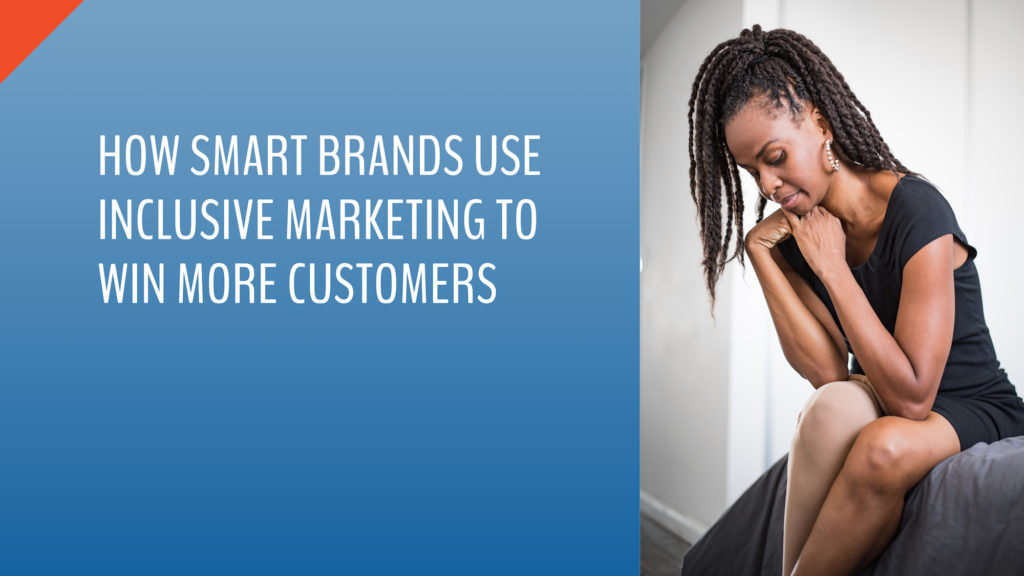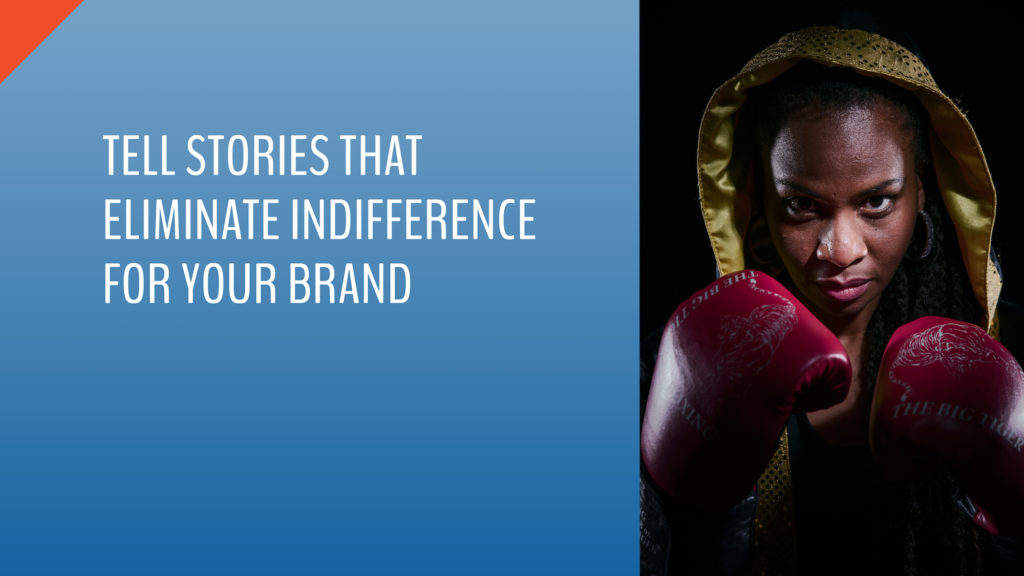Tucker Max is the co-founder of Book in a Box, a service that helps authors turn their ideas into books without having to write a word.
He is also the author of 3 New York Times best-sellers. His first book stayed on that list for five years and has more than 2 million copies in print.
We can learn so much from Tucker, including what he’s discovered about how to productize your service.
Key points:
- Why most people who have good books in them don’t actually finish them
- The one job of an entrepreneur
- Why you should force yourself to teach others what you know
- The difference between validating your idea and scaling it
- Why your strength in one aspect of your business can hold you back in another
- The foundational element that will make or break your success
- How to expand your offering into related product lines
Listen to the 32-minute episode here:
Show notes:
Transcript:
Sonia: Hey Tucker, thanks so much for joining me today, how are you?
Tucker: Good, good, how are you? Thanks for having me.
Sonia: Oh, it’s my pleasure. Alright, well let’s go ahead and dive right in. So tell me about your business, Book-in-a-Box.
Tucker: So basically what we do is we turn ideas into books, without you having to do anything except know what you’re talking about.
So I’ve developed a process, or my co-founder and I have developed a process where we kind of interview you in a very structured way, and take your ideas and put them in a book in your words in your voice.
Sonia: Got it.
Tucker: That’s the short pitch.
Why writing a book is so difficult for most people
Sonia: OK. So what would you say is the specific problem that you solve for the people you serve.
Tucker: For most people, writing a book is really hard. For the average person, even for professional writers that do this for a living, writing a book is hard, but for the average person it’s even harder.
It can take, it takes people anywhere from 1000 – 2000 hours, sitting at your computer typing to get a book out of your head. And that’s just not a realistic amount of time for most people.
That’s why most people who have good books in them don’t actually finish their books, is because they take so long.
So what we’ve done, is we’ve compressed that time from 2000 hours to 20 hours, that’s if you pay us.
So think about it. If you want to write a book, you have to first off you have to find the time. You’ve got to learn how to structure a book. Then you’ve got to worry about sort of what order you’re putting it in. You’ve got to learn all these things that don’t have anything to do with your knowledge and your ideas that are going into the book.
So we’ve basically eliminated that.
The way I like to compare it, like ‘we do to books what iPhone did to photography.’
You know, it used to be a huge pain-in-the-ass to be a good photographer, ’cause you had to have all this equipment. You had to spend all this time taking pictures, you didn’t know if they’d be any good, you had to develop film. Like all that crazy stuff.
Now, all you need is this tiny little hunk of metal and a good eye, and you can be a great photographer.
We’ve done the same thing for books.
A simple way to find your next breakthrough business idea
Sonia: Got it. So what made you decide, you and your partner, that you were going to be the ones to solve this problem? Because a ton of people want to write a book.
Tucker: It kind of fell into my lap to be honest. I wish I could tell you I had some amazing master plan and I was a genius and I saw this a decade out. But I didn’t.
I actually am, or was a professional author. I wrote multiple books and three of them were number one New York Times best-sellers, and they sold like 3-million copies worldwide, and translated to like forty languages, and all that nonsense.
And so I knew how to write books. I was very good at it.
I was at an entrepreneur dinner, and this woman asked me, she said “listen, people have been asking me to write a book for 10 years, but I don’t have the time to sit down at a computer for a year, and spend thousands of hours doing this. I have children and a business to run, I can’t also write a book. How can I get this book out of my head without having to do that?”
And so of course, being an elitist snobby writer, I made fun of her. I was like “are you asking me how to write a book without writing it?”
And she said, “yeah, I kind of am.”
And I said, “there’s no way to do that, it’s literally in the word: writing. You can’t do that.”
And I was kind of lecturing her about hard work, and being a total prick. And she stopped me and said, ‘Tucker, are you an entrepreneur, because this is an entrepreneur dinner. So I assume you’re an entrepreneur.”
And I’m like, “yeah, of course.”
She’s like, “hmmm, I don’t know. I don’t think so. Because I am an entrepreneur. And I spend all day helping people solve their problems. Are you going to help me solve my problem, or just lecture me about hard work?”
And she was a 100% right!
I was totally crestfallen and called out because I was being a prick and an elitist snob and she was right.
And so I got obsessed with this: How do I solve this woman’s problem? How do I get her book out of her head without her having to touch a keyboard?
And I didn’t think I could do it until I thought, oh my God, I’ve read so many books by famous titans of Western culture who never wrote anything down.
Socrates never wrote a word down. Jesus never wrote a word down. Malcolm X never wrote a word down. Buddha never wrote a word down.
They had scribes writing down their words in the books. And I was like, if Buddha could do it, why can’t Melissa?
And so I basically wrote down everything you have to do to write a book. Every step. And I knew them all. And then I was like, instead of telling Melissa to do these, what if I just got on the phone with her, and got the steps out of her by interviewing her, right.
And so the thing is, she didn’t want ghostwriting. Like she didn’t want me to write her book. First off, because she’s not like that. She wanted it to be her ideas, in her words, in her voice. But also, she’s like in this weird niche, pop-up retail, which is not that weird for retail people, but I don’t know anything about retail. I wear the same clothes every single day.
But also, she’s like in this weird niche, pop-up retail, which is not that weird for retail people, but I don’t know anything about retail. I wear the same clothes every single day. So I’m the worst person to write anything at all about retail. I wasn’t going to learn her field.
So I had to, it was about getting her knowledge out of her head and into a book.
And so we tested this. We got on the phone, and I knew each stage what we had to do. So first we kind of outlined her ideas, we structured them. I wrote a full outline. Then I interviewed her off the outline and got everything out of her head. Then I recorded those interviews, we got that transcribed, and then basically turned that transcription into book prose. So it read really well on the page.
And it turned out it worked amazingly well. I honestly didn’t think that this was going to work, and it worked great.
And then of course all these people. She referred people, I did a podcast talking about this, and we had twenty clients in two months.
All from an idea, I could have done this ten years ago, if I wasn’t so arrogant, that’s the problem.
Sonia: That’s a great story, and I think it’s something, the way you describe it is so simple. Somebody has a problem, and it’s something that we do every day. But we don’t necessarily see how we can translate that into a service.
How to turn what you know into a scalable business
So how did you go from, was there a specific process that you went through, to take something that you do every day as part of your career, to figuring out a way to take that system and make it into something that’s duplicatable for somebody else?
Tucker: How do I productize my service is what you’re asking?
Sonia: Right.
Tucker: Honestly, it comes down to really breaking down the steps. So what I essentially did is, I made explicit the knowledge I already had in my head. I knew how to construct a book. So I pretended that I was teaching Melissa how to do it herself.
And then I thought, if I had to teach her how to do it, how would I do it. So I wrote everything down, that I would have taught her, and then I just did that. I did each step. It seems like it’s a really obvious thing, just teach them how to do it or whatever, but you actually have to pretend you’re teaching someone who doesn’t know how to do it.
Because if I was just assuming in my own head, yeah I know it, I don’t need to write it down, I actually realized as I was writing these things down that I was skipping a lot of steps.
So as I was teaching Melissa, I made a lot of steps that were implicit, I made the explicit. And by pretending that it was somebody else, my co-founder Zach, I worked through this with him, and we kind of worked through that process.
He’s a really smart dude, but he didn’t know books as well as I did. So I had to explain a lot of things to him. And that forced me to get everything out of my head, and into this process.
And then basically, that’s what our process does with an author. We force them to get everything out of their head, and explain. And if they can’t explain it, they don’t actually know it.
It’s a great test. If you can’t teach something, you probably don’t know it very well.
You might be able to do it, but if you can’t teach it, you don’t know it.
And that’s what I did. I forced myself to teach it to somebody else, because that made it step-by-step-by-step.
And then, the next step was having Zach do it a bunch of times, and that created our process. And then from there, we have 14 full-time employees, and about 150 or so freelancers we work with, and the process is much more refined, but they all work through that exact process now. Exactly the way that we do. But they do it because of that first set of steps.
Sonia: Got it. This is fascinating. So one other quick question on this and how you were able to do it before we move on to some of your experiences. How many times did you have to go through it, your systematized process to validate that this works? Is it something like, you did it the first time, you make tweaks, did you have to do it like ten times, twenty times?
Tucker: That’s a good question. I think it depends on what your goal is. The first time will tell you that it works.
For us it worked the first time with Melissa. Now it was rough, it took us eight or nine months. Now it takes five to six months, but it was proof of concept that it worked.
But doing it yourself is not the same thing as doing it at scale. We’re doing this at scale now. We’ve done 300 books in two years, and I haven’t done a book in a long time.
Really, we have more talented people than me working the process, but it took us a long time. If you think of it like the 80/20 rule. The first eighty percent, we got the first go-round basically. That last twenty percent took like a year and a half.
It was really hard to really refine it, and really nail down every detail so that we could have other people do it the same as we do it or even better.
That took a lot of attention to detail, and that took a lot of work. But validating the concept is basically, can you do it once. Scaling it is, can you have other people doing it, independent of you, with the quality necessary. And I think those are different skills that take totally different amounts of time.
Sonia: For sure. For sure. Alright, well let’s switch gears a little bit, and find out more about your experiences as an entrepreneur.
The mindset you need to build a scalable business
You’ve mentioned that you’ve been writing books for years, and you’ve had all these best-sellers. But what would you say is the number one mindset barrier that you had to overcome, that enabled you to be successful in growing your business?
Tucker: So, it’s funny. The thing that helped me be a really good writer actually held me back in business.
When you’re a writer, basically you can do everything yourself. In fact, that’s one of the reasons why I was good at writing, and I liked it, is because I could totally rely on myself and the buck stopped with me.
I didn’t have to delegate things, I didn’t have to outsource, I didn’t have to teach other people anything. I just had to be my own self-contained little genius, and either it worked or it didn’t.
It doesn’t work at all like that in business.
Even the smallest businesses, like right now, we’re only fourteen people or something, working with a hundred, hundred and fifty freelancers, pretty small business by business standards.
But if I tried to have anything even approaching that same mindset that I’m gonna do it all myself or it stops with me, this business would not work at all. It would be a disaster.
In fact, I recently, about four months ago, fired myself as the CEO of this company and we brought in an outside CEO who’s done amazing. He’s way better than me, because I was the throttle on growth of this company, because I was still holding too much internally, and trying to make everything flow through me, and trying to do everything myself in a lot of ways. And it just wasn’t working.
It just doesn’t work. It doesn’t scale.
You’ve got to not just learn how to trust people. But you’ve got to find the right people, and then you’ve got to basically empower them to go do, basically what you want to do is hire better people than you at a job, and then leave them alone and let them nail that job.
And I was not good at that, that was the mindset that held me back.
I was so bad, instead of changing the mindset, I just fired myself and hired someone who was really good at it.
I just got the hell out of the job.
Sonia: So was there a specific thing that happened? Because you’ve known this about yourself for a while, but was there a specific thing that happened where you were like, ‘oh gosh, I’ve got to make a change right now.’?
Tucker: Zach and I started the company, and I was CEO and he was COO. Those were our roles. And I saw he was screwing up, he has a similar problem. So he was screwing up in the COO role, so we decided to hire a general manager, someone who was just in charge of operations.
This was going to be a big hire for us, it was really important, etc., etc. We spent a lot of time interviewing and looking for people, and I decided early on on the person I wanted, and I basically stopped being a critical thinker and I started defending my selection, and that just doesn’t work.
That created a big problem. And we ended up hiring the wrong person. She was a great person, but she was a disaster for the company. And it really hurt us a lot. And because of that, it was basically my fault.
And that mis-hire was what led to me saying, ‘you know what, I’m not right to be CEO. He’s not right to be COO, I’m not right to be CEO, we both need to do different jobs in the company, and we need to bring in someone who is better than us at those two jobs. And that’s what we have now, we have an Ops director and a CEO who are ballers and amazing at their jobs. Way better than we ever were.
Sonia: Wonderful. That’s an excellent lesson. Alright, you mentioned earlier that you were lecturing your first client about the virtues of hard work. So what would you say enables you, are there specific habits that you have felt enabled you to work as hard and produce as much and get the type of results that you have received over the course of your entrepreneurial career?
Tucker: It’s a good question. I don’t know. I mean, don’t know if I have a set of habits, probably if you sat around and watched me you would notice things that I don’t notice that are sort of like ingrained in me.
I would say there’s actually two things maybe. It’s not a habit, it’s more of a mindset. In terms of habits, I don’t think, in fact I don’t think that I have good habits. It’s one of the things I’ve been working on, is developing better routines, because I always get my work done.
I don’t feel like I get it done in a really timely or efficient manner. But, I do have two good mindsets. One is that I am always, always questioning my assumptions and what I think.
If I think X, I’m never like, oh I think X and that’s it. You know like, if you’ve ever argued with someone about politics, either side. Like abortion, minimum wage, whatever it is, it doesn’t matter. It doesn’t matter how many facts you present to them of the other side, they’re never going to change their mind, so what I always do is I ask them, “what evidence would change your mind about abortion, or minimum wage or whatever?”
And most people can’t even answer! Their like, “there’s no evidence.” So you don’t actually have a belief, it’s not a reasoned belief, you’ve just decided that you have a position and that’s it.
I am almost never like that. I have changed my mind on almost everything in my life multiple times, and I’m always willing to examine my assumptions, and I think most people aren’t.
And that’s really important as an entrepreneur. I’ve been an angel investor for five years, and I’ve invested in like 80+ companies, and that’s one of my number one things that I will not invest in, is someone who does not have a flexible mindset in terms of thinking what do they believe.
And if they don’t believe what the facts tell them, then I won’t invest in them. That’s one thing.
The other thing is, I’m always willing to ask the hard questions. It’s kind of tied together, but both about myself and about the company.
So many people will embed, “I believe X” and that’s just it, you can’t talk them off of it. I’m always willing to go back and ask, ‘should we be doing this? Is this the right way? Why are we doing it this way?‘
That’s why I ended up firing myself as CEO, is because I asked the hard questions, ‘should I be in this role? Am I qualified to do this?” And the answer was pretty clearly no after a certain point.
And so being willing to ask the hard questions, and willing to challenge assumptions, and then taking the actions that those lead into, are two of the reasons why I’ve been successful in a lot of things is those two attributes.
Sonia: Now would you consider these your superpowers, or your secret sauce that has enabled you to have the success that you’ve had over your career, or is it a combination of a couple or a bunch of different things?
Tucker: I don’t know. That’s a good question, I’m not sure. If I knew that absolutely certain, then I would bottle it and sell it, if I knew absolutely what led to my success.
Probably those two things definitely, and if there was one other thing I would point to, it’s I’m willing, you know what it is, I think a lot of people are afraid of, not just risk, they are afraid of change.
And I’m not afraid of change. And I’m not afraid of taking risks. In fact, I’ve probably taken too many stupid risks in my life. But I know so many people who are smarter than me, and more talented than me, and by all rights should be way more accomplished than I am, and do way more, but they don’t.
And the only real difference I see is that they are afraid. They are afraid to take risks and they are afraid to do things. They are holding on to something, or they are afraid of what other people will think, or whatever.
It’s not that I don’t care what anyone else thinks, or I’m not afraid at all. It’s more that like, I’m more afraid of not taking the risk than taking it. I’m more afraid of being stagnant, than change.
And most people are more afraid of change than they are of staying where they are.
Sonia: Definitely. Definitely.
How to effectively differentiate yourself from others businesses that do what you do
You mentioned that with writing books, you’re able to do much of that work yourself. But now you’ve got a team of people, you’ve got a co-founder, you’ve got people that you work with.
If you had to rate yourself on a scale of 1-10 of where relationships fall in the importance of what you do and getting things done, what would you rate yourself?
Tucker: Uh, 11?
Sonia: OK.
Tucker: Like, we’re a relationship company. Our process is how we started, but once the process is fixed and we have that figured out, it’s a commodity at that point. And now what matters is the relationship we have with our authors, and the people that work with us.
Sonia: Got it.
Tucker: It’s all about that. We’re not a software company. If you’re a software company, I guess you don’t need to have a relationship with your software or something, I don’t know.
But we deal with people man, on both sides. With the freelancers we deal with, and internally, and with our authors. They are all people. And how we navigate and negotiate those relationships is what determines our success.
It’s not like how important are they. It’s almost like asking how important is air. There’s nothing here without it. It’s foundational.
Sonia: OK. Is there anything you do specifically to make sure that you nurture those relationships because they are so essential to your existence?
Tucker: Yeah, well it’s funny, there is, and that’s one of the reasons why I’m not CEO is because I’m not so good at that.
I’m really good at intimate relationships, like deep relationships with people that I know and I like. I’m not so good at like, I don’t want to say shallow, but more casual sort of relationships.
My CEO is. He’s really good. He’s good at both. And that’s why he’s CEO man, because he’s straight up better at relationships than I am.
Right now, most entrepreneurship you see is in the tech business. And because that business, it’s kind of an unusual inflection point in history, you don’t have to be super relationship-based in tech right now.
But, the thing is, all tech eventually becomes commodified, which means that all business becomes about people. Which means they are about relationships.
And you’re starting to see that businesses that get that, even the tech business, win. And the ones that don’t, don’t.
A perfect example is Dell vs. Apple.
Steve Jobs was terrible with people. But the difference is that Dell is just a commodity company, they just make computers, no one cares about their stuff.
Apple makes hardware that you feel like you have a relationship with. And even though they are not good interpersonal relationships, they make products that feel that way.
The next iteration of that is a company that makes great products, but they actually are great at customer service too. Like you feel like you know them. That’s the next step.
There are very few businesses where relationships don’t matter, and I think, especially as artificial intelligence (AI) comes online, and other businesses, all of tech is ultimately about connecting people, and if you can’t negotiate those relationships, you’re going to fall behind the people that can.
How to expand your business into related fields (and how to get started)
Sonia: Definitely. Alright, so what can we expect from you and your team in the future?
Tucker: We’re going to get bigger. We’re going to do more books. We’re going to become the default place for professionals to do books.
I mean right now, we’re still small, we’re only two years old. Three hundred books is a massive amount in the industry that we’re in, it’s incredible actually. But in terms of the potential market out there, I think there’s at least one hundred thousand, probably two or three times that many people who could be clients of ours.
So we’ve barely even scratched the surface of our clients, or the potential clients that we could work with.
And I think we’re going to expand beyond books. What we’ve done is create a process, and turn an idea into a finished media product. And I think eventually we’re going to go way beyond.
There’s no reason we can’t do speech-in-a-box, podcast-in-a-box, pitch-deck-in-a-box, any number of things.
We’ve already started. We have a beta division that Zach started, called Platform-in-a-box, where instead of just a book, we’re doing an entire media platform for people, and all they have to do is get on the phone with us, and know what they’re talking about and we’ll handle everything else.
As long as people need to communicate with other people, we’re going to be communicating around that, so it’s probably not going to end in my lifetime.
The fundamental principle for building a successful business
Sonia: Oh, that’s super exciting. Any parting words of wisdom for entrepreneurs who are working hard to build a successful business trying to make life better for the people they serve?
Tucker: Yes, you actually nailed it. This is kind of my boilerplate advice for entrepreneurs. It’s so fundamental, and so many people either ignore it or don’t think about it, and you actually nailed it with the second part of your thing.
You said “entrepreneurs and the people they serve.” The entire point of business, entrepreneurship is starting a business, all business, all business, without exception, is about meeting the needs of someone.
That’s why people give you money for a product or a service. It’s because it meets their needs. They value what you are doing more than they value the money they give you.
And people forget about that. They talk about the economy like it’s some disjointed thing that lives outside of humans. That’s nonsense! It’s humans serving other humans and exchanging money as the medium of exchange for that.
But the money represents other goods and services. That’s all it is. It’s people exchanging goods and services with each other, so that they can have better lives.
And so many entrepreneurs are like, yeah, I want to build a business, I want want to make money. And it’s not that it doesn’t matter. It that the only way that you get that trophy of lots of money, famous, big business, whatever, is by meeting the target of meeting real needs that real people have. Solving real problems.
And if you focus on that, and hit that over and over again, everything else comes.
Sonia: Definitely, and that links back to what we started with in the beginning, and how the business that you’re working on now sort of was born.
Tucker: Yep.
Sonia: Alright, before I let you go, I do have one last question for you, just to give a little more insight into the person Tucker. And that is to deliver a line from a movie that sticks out to you, and explain why you chose that one.
Tucker: Awww, that’s so good. Alright. I actually just talked about this a few weeks ago with my CEO. You know the movie Hustle & Flow?
Sonia: mmmhmmmm.
Tucker: I love that movie. I think it’s the best movie out there, Hustle & Flow, and 8 Mile are the two best movie about what the creative process looks like. And Hustle & Flow is very much an entrepreneurs movie.
You think it’s about rap music, and it’s not. It’s about a creative group of people who are creating something new, making something out of nothing.
So many great lines in that movie! One of my favorites is when the pimp rapper, Terrence…
Sonia: Terrence Howard
Tucker: Terrence Howard plays. He goes over to Anthony Anderson, the producer’s house. And he’s like kind of convincing him to come work with him. And Anthony Anderson gives this amazing speech about how the world is filled with two people: talkers and walkers.
And he is basically calling out Terrence Howard, like, “I think you’re a talker.” You know. And he’s “I’m a walker, and I think you’re a talker.”
So they start actually working on stuff and he’s like hittin’ music and Terrence Howard is rappin’, and Anthony Anderson’s totally prim and proper wife comes in and she’s like “what’s going on here?”
And Anthony looks at her and he’s like, “we walkin'”
That’s one of my favorite f*@!ing scenes from a movie, ’cause to me that represents entrepreneurship.
Like, you want to be an entrepreneur? F*@!ing walk. Walk the walk.
Sonia: Absolutely. Absolutely. I love it. Tucker, this has been fantastic, thanks so much for joining me and sharing all your insights, it’s been really good.
Tucker: Awesome, thank you. Thanks for having me.
Sonia: My pleasure.
Free Mini-Course: The Blueprint for Building a Thriving Business
Free Mini-Course: The Blueprint for Building a Thriving Business
Learn where to direct your energy so you can win more customers, grow your business, and enjoy more freedom
- Framework based upon in the trenches experiences from 100+ successful entrepreneurs, including several who’ve built multi-million dollar businesses
- Science-based explanations to support why the blueprint works
- Action items to help you get some quick wins







